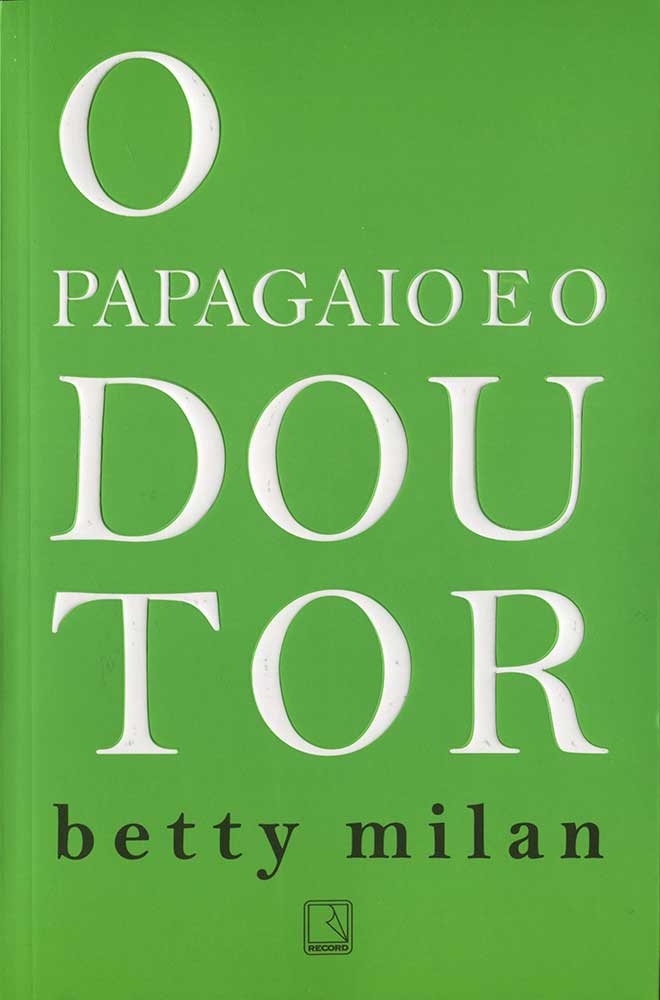
excerpt
Seeing me, the Doctor dreamed, Pantagruelian hunger. Obviously, it was I who would be paying for the dream. True, I could only deliver the equivalent of several bunches of bananas in heavy gold, because in the past my people played the role of beasts of burden, a hundred kilos on their back, drawing blood and pus, peddling from sun to sun and door to door. Of course I would never say that to the great man.
Calling card? Well, simply to omit the story of those who left Lebanon to seek their fortune in the New World, the saga of my grandparents, the “Turks” of Açu, also called people-eaters, those who in France would have merely been Arabs among other Arabs.
synopsis
O Papagaio e o Doutor is a novel about the “Turks” of Brazil. The story is narrated by one of their descendants, Seriema, who went to France to undergo analysis with a renowned Doctor inspired by Jacques Lacan.
Recovering in analysis the past of immigrants, she liberates herself from the Doctor and from her ancestors to become who she desires to be, and to cultivate the language of Brazil, or the language of –ão, about which she dreams.
In her irreverence, Seriema evokes the Emília of Monteiro Lobato and the “hero without any character” of Mário de Andrade’s Macunaíma. Like Emília, she says what she thinks. Like Macunaíma, she disdains the feeling of guilt. She laughs at herself and at others in order to be free. Except that, unlike Macunaíma, she doesn’t die at the end of the novel, isn’t transformed into a star, and departs the scene happy to be Brazilian, of mixed race, and a woman.
history
First published in Brazil in 1991 by Editora Siciliano, its book launching took place at the Livraria Siciliano on July 3, 1991. In 1997, it was published in France by Editions de l’Aube and launched at the Brazilian Embassy and at the Maison de l¹Amérique Latine. The French translation led the author to rewrite the text in Portuguese. The definitive version was published by Record, in 1998, and launched at Livraria Cultura on March 4, 1998. In addition to being published in French, it was translated into Spanish and published in Argentina by Homo Sapiens that same year (photos and posters). In 2019 the rights to film adaptation of the book were bought by the american director Richard Ledes . The movie counts with David Lynch’s actor David Patrick Kelly, in the role of Lacan, and Ismenia Mendes as Seriema.
opinion
BRASIL
“She writes like someone replacing the crossties on a railroad track for a new train route. Think about it. Sweet like grape honey.”
José Celso Martinez Corrêa, Folha de S. Paulo, September 7, 1991
“I read the book taking delight on several levels: the fictional, the documentary, and the level of personal testimony.”
Moacyr Scliar, November 1991
“I enjoyed both your Parrot and your Doctor. And Seriema, with so many twists and turns, always very well written.”
Otto Lara Resende, letter of March 17, 1992
“In this novel, Betty Milan imparts a subtle touch of modernity to our prose fiction, still quite accustomed to the documental (…) leading the Brazilian to contemplate himself in the mirror of the world, and not merely in the limits of our third world.”
Deonísio da Silva, O Globo, March 7, 1998
FRANCE
“The story, given the simplicity that emerges in every strong work, can be synthesized in a single proposition: Seriema goes in search of her soul in the capital of the spirit, discovering there that she is in her country of origin and that the spirit hovers in all places.”
Michèle Sarde, afterword to the book
ARGENTINA
“O Papagaio e o Doutor is the testimony that it is possible to disengage oneself from maktub to write a more personal story.”
José Manuel Ramirez, May 4, 2000
BELGIUM
“Seriema retraces with incredible power the destiny of Don Quixote. The day he renounces his dream, he dies. The day she does the same, she dies, only to truly live.
In this sense, O Papagaio e o Doutor is a novel that soothes the soul.”
Pierre Maury, Le Soir, March 18, 1997
PORTUGAL
“A very intelligent book, quite funny, very theoretical, and very well written, that pleased me from beginning to end, and made me feel like engaging in dialogue.”
Eduardo Prado Coelho, April 22, 1997
areas of interest
Literature, Clinical Psychology and Psychoanalysis, because of its portrayal of analysis with Lacan. Sociology and History, because of narrating episodes of Lebanese immigration in Brazil.
critical reaction
where to purchase
Livraria Cultura (e-book – portugues) | Amazon (e-book – portugues)


